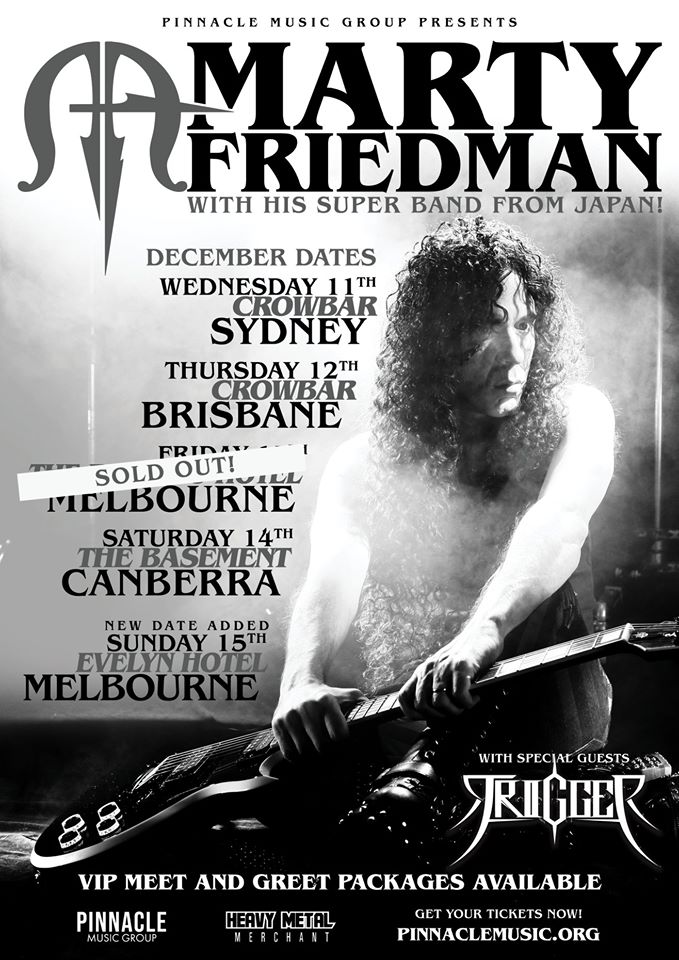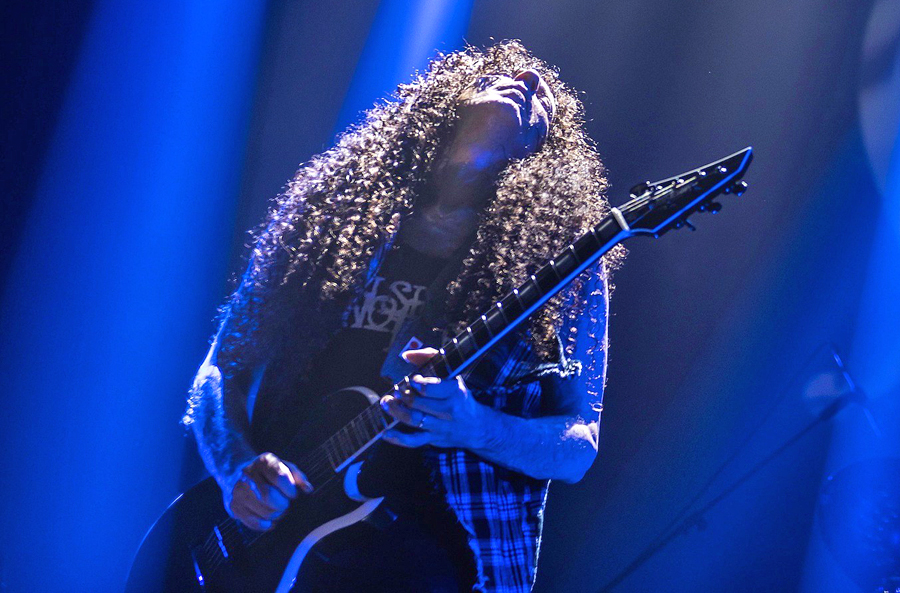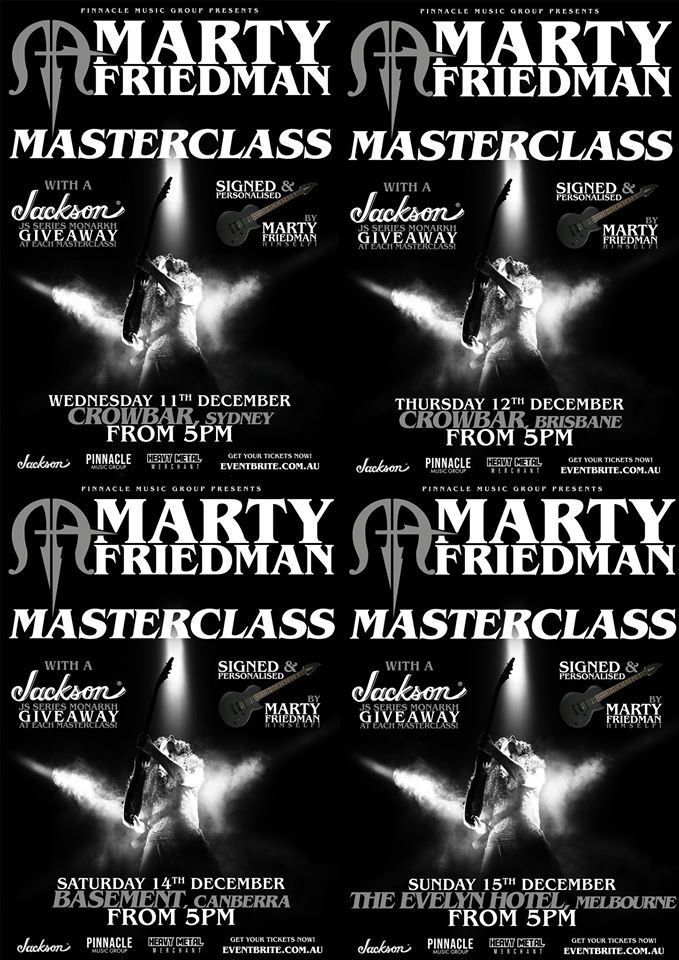Interview with guitar legend MARTY FRIEDMAN 3rd December 2019
Hello Marty, it’s Davey from Maximum Volume in Australia, How are you doing today?
All right. Nice to meet you.
Oh, nice to meet you too. How has the current tour been so far? I’ve seen you’ve actually played in India and Indonesia.
Oh yeah. Well I’m not really on tour. I break it up into separate tour run type of thing. I was on … I think about a month in America, a month and a half earlier this year, and then I did a few shows in Asia and doing some stuff in Japan. I did a festival in India, so it’s like I’m always on tour, but I’m not constantly on tour, if that makes any sense.
It’s all great. It’s all being really good. It’s basically promoting my new live album One Bad M.F. Live!! and that gives you an idea of what the show’s like, but just a lot of fun. Everybody’s enjoying my band and cannot complain.
Oh, that’s cool. Now was that your first time in Indonesia or India or have you been there before?
First time in India ever and playing live. It was really exciting, played a festival as well, and it seem like India is one of those places where I get an offer to go there maybe once or twice every year and it never really gets past the offer stage for one reason or another. This time a really good promoter was on board and everything was really done professionally, it was a great festival.
It was really nice to see that there were a lot of fans of my music in India because I hadn’t really ever … What’s the word? Cultivated that country, but they knew who I was. I actually got the headline, this really nice festival with a lot of really good bands. It was flattering and the show went great.
In Indonesia, it was actually the first time for me, but it wasn’t a show. I wasn’t with my band. I just did a couple of master classes. Yeah, guitar seminar type of things. A little different, but I’m sure I’ll be playing there with my band sometime soon.
Oh, that’s excellent. Now it’s been a long time since you’ve been in Australia. You were here in 2010 doing a bunch of guitar clinics and I think the last time before that may have been the Rust in Peace Tour? This will be the first time you’ve played your solo material here ever. Tell us what we can expect and tell us about your Japanese Super Band.
Yeah. It’s really exciting for me to go to Australia the first time with my solo music, and I know that there are a lot of hardcore fans who have been following me for so long without me coming down there. I really appreciate the support. It’s really hard to be a fan of somebody when they don’t play for you. You know what I mean? When they don’t come to where you’re at.
I’m really fortunate that this time the Australian tour is happening and play proceeds to future tours. I usually play my most recent material when I go on tour, but in this case this was the first time ever playing in Australia with my solo stuff. I’m going to go all the way back to my first solo album. Just I do a lot of stuff that I normally don’t do because I got a lot of ground to cover.
It’s not like I’m just promoting my most recent album. It’s going to be a first time. I want to pay some attention to the people who’ve waited a long time, as well as a lot of the much younger people who might only know my newer stuff, maybe people don’t know my stuff at all.
It’s really fun choosing the set list for Australia because a lot of stuff I haven’t touched in a long time, and a lot of the new stuff I’m changing as it relates to the old stuff and it’s just a completely new setlist within a new thing. It’s going to be fresh for everybody especially me and the band.

Oh, awesome. As long as you play a few tracks off Dragon’s Kiss, this fan will be happy.
Oh, I’m glad. We’ll be doing that.
As mentioned before, tell us a little bit about your super band that you’re bringing Down Under
Yes. It’s just a killer band, one of the most … I’ve had a few, if you watched some of our stuff online, the most well known member of my band is Kiyoshi the bassist, she’s just a spitfire. She’s just unbelievable and she has her own solo career here in Japan, but she’s also been in my band as a main member for five or six years now.
I have fans around the world who expect her and, she is just the most aggressive bassist I’ve ever seen, male or female. I think people are going to be blown away.
The thing about my band from Japan going to Australia is really an honor that not too many people from Japan get to experience. They are really excited about it, but it’s also the percentage of Japanese musicians who can actually go to Australia and play is just so incredibly small that when they go and do this tour, they’re going to have a really, really big story to bring back with them in Japan.
I’m really happy to be the guy to be able to share that with them and I’ve only been to Australia a couple of times and new for me too, but I still do feel like I’m either going to be guiding them in this tour in some way. I’m really happy that I could be part of their first Australian experience.
That is so cool, they’re going to have an absolute blast. Now speaking of Japan, it seems you’ve had some sort of attraction to Japanese music ever since you’ve started playing guitar from what I’ve read in other interviews obviously with Enka and so forth. Can you give us a little bit of a brief rundown on how you started playing guitar and how you went from Enka to going into metal?
Well to give you the short version, I was just a good old American rock and roll guitar player and when I moved to Hawaii, suddenly I got surrounded by all kinds of different cultures. When you hear music from other cultures, especially when you’re in your mid to late teens, you’re a sponge for new and interesting things to add to your musicality. That’s where I heard Japanese Enka music and I got spell bound by the vocals and I wanted to learn how to do that on guitar.
In the course of doing that, they really gave me something different. Most of the other guitar players around me were learning Jeff Beck, Van Halen, Jimmy Page and clocked in with all those guys. They are damn good at it, really, really good at it and that wasn’t for me. I could never really master what those other guys were doing, but I started getting these influences from different places like Japanese Enka music vocals, and Chinese traditional violin-type music, and Indian ragas and everything is just a little odd.
That turned out to be a big part of my musicality. It started from just copying Japanese Enka vocals, guitar and learning things that you don’t really learn from a normal guitarist. That turned into being a big identity factor for me.

The first time I heard your playing and many others would be on the same page, was when Megadeth released Rust in Peace. Not only was the album destined to be a thrash classic, there was this new lead guitarist who was blowing minds with his unique guitar style. Fans were like, “Who the hell is this guy? This is so awesome, so different.” Your playing was so metal, yet you had that exotic sounding Middle Eastern flavour happening.
Well, like I say, I mean it wasn’t really like I learned a particular style. It was when I was in my mid to late teens, I started hearing all this foreign music and I started picking up random things really. If I’ve heard something interesting that I didn’t usually hear from a guitar, maybe it’s a voice, maybe it’s another instrument, maybe it was the unique rhythm especially in Indian music and Middle Eastern music. They do a lot of strange, dividing of rhythms. I get into that in the late teens especially as a rock and metal playing teen, really opened up some really weird concepts that I was developing and mixed it in with whatever heavy music I was playing. People liked it, I was flattered then and I’m still really flattered now that the people can accept it, sometimes to me it feels so strange.
Like you said even even listening to it now, it’s still fresh because no one else has really done that Middle Eastern style with metal and that was back in 1990 so it definately stands the test of time.
Yeah, well hopefully, I’ve evolved with that. I mean I think I’m still being the musician as I was back then, but I’ve definitely made it a lot deeper. I’m taking those concepts and adding so many more things since then and understanding how to get more results out of what I know of those things. So if I look back on the older stuff, I still like it but the newer stuff is definitely … it’s on steroids really, because I had never really stopped discovering new things to put in the kitchen sink, so to speak. I can understand how to just play better.
Well it’s the same guy, but if I compare “Dragon’s Kiss” to say “Wall of Sound” or something like that. You can tell it’s the same guy hopefully, I’m hopefully doing it in a more, getting my goals done better, getting … making people feel the music better. That’s really the only goal, but if you’re a fan of something a lot of it doesn’t have to do with the music itself. It has to do with where you are in life when you discover that music.
When you take that particular generation but for me as the artist, I am always trying to do something new that I’d never done on the previous album. Veering off your question, but hopefully the people when they come and see us play, they’ll hear a much more evolved version of what they originally liked about my playing, if they liked anything at all.
After you played with Megadeath for almost a decade, you decided to pack up and move to Japan to start from scratch, which is a bloody scary thing. However, all the puzzle pieces have seemed to come together for you over the years. You’ve been in K-pop bands, you’ve had your own TV shows, Hebimetal-San and Rock Fujiyama, appeared as a guest on multiple TV shows. You’ve basically gone from being a nobody to a national celebrity, a household name in Japan.
Yeah, I mean it was a crazy thing to just up and leave my own country and come to a completely new country, new culture. I totally support people trying to do what they feel like they were meant to do, even if it involves doing something that sounds really stupid on paper. ( laughter )
I really think that’s the key, man. You’ve got to take a couple of risks, worst thing that you could do is fail and go back. So I did that and had no desire to do anything with TV. I just wanted to play Japanese music, but I agreed to do a TV show. From the pilot, they immediately took me aside and said, “Look. We’ve got to seriously talk about putting you on the contract with a whole new series,” and then that series turned into six seasons.
Then once that happened, the people see the show and when you’re on other shows. It just snowballed and it’s such a thing that it’s completely eclipsed what I was trying to do musically, which is … which at first, it’s like, “Wow! I’m really, really enjoying this.” But, after 700 TV shows and maybe 800, I really enjoyed the perks of doing all that stuff, the experience, but in my soul, in my heart and all that stuff, I have to play music for people and play around the world, and just tour like I was born to do.
Over the last maybe two, three years, I didn’t … taking a little bit more effort to be away from Japan for a month or two at a time and be touring stuff. But, things went way better than I ever expected and many, many dreams came true and I got to work with some of my favorite famous Japanese artists, still do right now all the time. Just constantly in the middle of three or four projects and I’m really excited about. It was just from that really crazy, almost stupid decision to just leave America, and start from zero in Japan that really, really was the starting point.
Of course there was six months or so where I was here in Japan and I had no idea what the hell I was doing. Nothing came overnight, but once things started happening and things turned out really good. It’s nothing to complain about it at all.
Now finally, it’s like I’m allowed to go around the world now, it’s more than I did before. When you’re doing television programs and you have regular programs, if you’re a regular on the show, that show tapes weekly, well there goes any chance of touring outside of Japan for more than a day.
If you have to be somewhere every Wednesday, then it eliminates any kind of international tour. For a while, I was cool with that, but after awhile I’m like, “It’s not really me.” I mean I’m working and I’m enjoying. I’m having fun, but when I come and play in Australia that’s my most relaxed and my most natural habitat. So now I really enjoy doing that.
Oh, definitely! Now, talking about the Japanese music scene, getting away from the K-pop and the more traditional Japanese stuff, there seems to be a lot of heavier Japanese bands over the recent times that are making it big globally. Obviously Babymetal, then you have others such as Maximum the Hormone, Crossfaith, Coldrain, & ONE OK ROCK. What are your thoughts on some of those bands?
Well I love all of them that you mentioned and I’m really excited that you know all of them, that’s a big plus. All of those bands are fantastic, I did a collaboration with Crossfaith that came out fantastic.
Oh, are you a Crossfaith fan?
Most certainly am, I love Crossfaith
Yeah, actually I did the theme for a Netflix anime called “B: The Beginning”
I wrote and did the main theme song called “The Perfect World” with the singer of Man With a Mission. The song was very popular, popular enough for the record label to ask me to do an entire album of music that was inspired by the anime called “B: The Beginning”
With each song, I had different guests from Japanese bands and Japanese artists that I liked and so I had Man With a Mission. I had the singer of a 9mm Parabellum Bullet on there, then I had Kenta from Crossfaith, and the song we did is called “The Blackened Light”
I don’t know if you can hear it on YouTube, but I’m sure you can search on Spotify or something. But yeah, it’s really a truly metal song, he did a great job. So all these bands that you mentioned are really popular here and the great thing about that, is they’re not really necessarily considered in a separate genre than any other music.
I mean in Japan it’s almost genre-less and you’re listening to harp music, visual kei music, and sometimes idle music and even dance music has heavy moments in it. I like the fact that genre lines are very blurry here, and people can cross those lines without any repercussions.

That’s really cool! Now getting back to the upcoming Australian tour, you’re also going to be doing some guitar master classes
Yeah those, I don’t really do anything. ( laughter ) I just answer questions. I sit there and I play a bunch of songs, maybe some stuff that I don’t play live. A lot of people are going to go to the concerts too, so I do stuff that I don’t do live, maybe more ballads or something. I just let the audience run the whole thing. I just let them have questions, as many questions as they want and answer everything. That gets everybody more satisfied. I certainly have no agenda trying to teach any kind of musical anything, so I’d just prefer to let them run it, and let them ask me what they want and we always have a good time.
Well, I’ve got my ticket to the master class in Brisbane. Really looking forward to seeing you live for the first time, been a big fan of your playing for almost 30 years
Well, thank you very much. I appreciate that.
Thank you so much for your time today Marty. It’s been an absolute pleasure to chat with you, and we’ll see you here in Brisbane next week
My pleasure, I’ll see you there.
Get your tickets for the shows and masterclasses at… http://www.overdrivetouring.com/marty
Interviewer/ Writer: Davey Rintala



